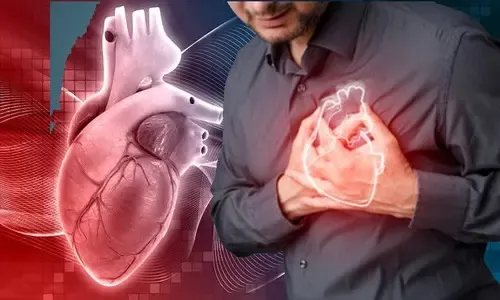Artificial Intelligence Identifies Patients at Risk of Serious Arrhythmias and Prevents Sudden Death

Synopsis
Key Takeaways
- AI can identify serious arrhythmia risks.
- Over 5 million sudden cardiac deaths occur each year.
- Algorithm detects risks in 70% of cases.
- Developed by a collaboration of European and US researchers.
- Future applications may include monitoring via smart devices.
London, March 30 (NationPress) The use of artificial intelligence (AI) has emerged as a significant tool for researchers in identifying individuals who are at risk of developing serious arrhythmias, conditions that can lead to cardiac arrest and sudden death.
This groundbreaking study, set to be featured in the European Heart Journal, involved the creation of a network of artificial neurons designed to mimic the functionality of the human brain. This project was a collaborative effort involving researchers from Inserm, Paris Cite University, and the Paris public hospitals group (AP-HP), alongside their American counterparts.
Through the examination of data encompassing over 240,000 ambulatory electrocardiograms, this advanced algorithm successfully identified patients at risk of experiencing serious arrhythmias that could lead to cardiac arrest within a two-week timeframe in more than 70 percent of cases.
Every year, sudden cardiac death accounts for over 5 million fatalities globally.
The study suggests that AI can enhance the early detection of arrhythmias—heart rhythm disorders that can escalate to fatal cardiac arrest if left untreated.
Engineers from Cardiologs (part of the Philips group), in partnership with Paris Cite University and Harvard University, developed the artificial neural network used in this research.
This innovative algorithm mimics human brain functions to further prevent instances of sudden cardiac death.
Researchers analyzed millions of hours of heart activity, utilizing data from 240,000 ambulatory electrocardiograms gathered across six nations: USA, France, UK, South Africa, India, and Czechia.
Thanks to AI, new precursors that indicate a potential risk of arrhythmia were identified. The research particularly focused on the duration required to electrically stimulate and relax the heart ventricles throughout a complete cardiac cycle.
Dr. Laurent Fiorina, a researcher at the Paris Cardiovascular Research Centre (PARCC) (Inserm/Paris Cite University), stated, "By monitoring their electrical signals for 24 hours, we found that we could pinpoint individuals likely to develop a serious heart arrhythmia within a two-week period. If untreated, this arrhythmia can lead to fatal cardiac arrest."
Although the artificial neural network is still undergoing evaluation, the study demonstrated its capability to identify at-risk patients in 70 percent of cases and ascertain no-risk patients in 99.9 percent of instances.
Looking ahead, this algorithm could be utilized for monitoring patients at risk in hospital settings. With further refinement, it may even be integrated into devices such as ambulatory Holters for blood pressure monitoring to detect hypertension risks, and potentially even smartwatches.
The research team is now focused on launching prospective clinical trials to assess the effectiveness of this model in real-world scenarios.









